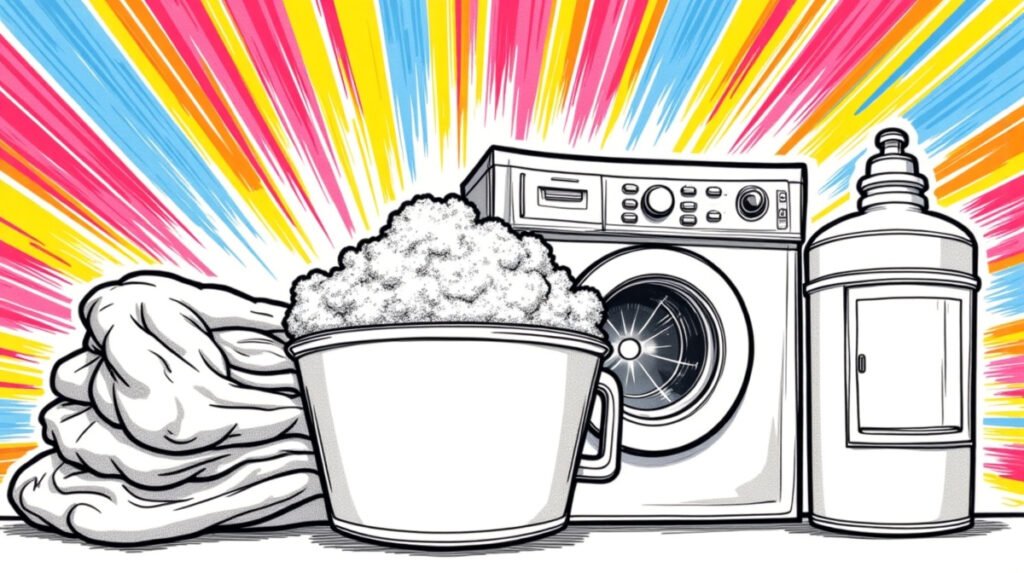Running out of laundry detergent when you have a full hamper is a common problem. Before
you resort to washing with water alone, you should know there are several effective alternatives
you can use in a pinch. Some are common household items, while others are eco-friendly
products you may want to adopt long-term.
This guide provides a straightforward look at the best laundry detergent alternatives, how to use
them safely, and what results you can expect.

Effective Household Alternatives (For Emergencies)
These are items you likely already have at home. They can be very effective when used
correctly for a single wash or until you can buy more detergent.
1. Baking Soda: Baking soda (sodium bicarbonate) is an excellent deodorizer and water
softener. It helps remove smells and can boost the cleaning power of other agents by balancing
the water’s pH level.
- How to Use: Add 1⁄2 cup of baking soda directly into the washing machine drum with your clothes. It works well on its own for light cleaning and freshening or can be combined with a small amount of soap.
- Best For: Deodorizing smelly clothes (like gym wear) and softening fabrics. It is less effective on tough stains.
2. Distilled White Vinegar: Vinegar is a mild acid that works as a natural fabric softener and
clarifier. It helps remove soap residue from clothes, making them feel softer and appear brighter.
- How to Use: Add 1⁄2 cup of distilled white vinegar to your washing machine’s fabric softener dispenser during the final rinse cycle.
- Important: Do not mix vinegar directly with bleach, as this creates toxic chlorine gas.
- Best For: Softening fabrics, reducing static, and removing musty smells.
3. Dish Soap (Use With Extreme Caution): In a true laundry emergency, a small amount of
liquid dish soap can be used. However, you must be very careful, as most dish soaps are
formulated to create a lot of suds.
- How to Use: Use only 1 to 2 teaspoons for a full load in a standard or high-efficiency (HE) machine. Using more can create an overflow of suds that can damage your machine and void its warranty. For more information on what’s safe for your machine, it’s always best to consult an authority like the American Cleaning Institute.
- Best For: A last-resort option for general cleaning when nothing else is available.

Powerful DIY Laundry Soap Ingredients
For those interested in making their own laundry cleaner, these ingredients are more powerful than the emergency options listed above.
4. Washing Soda: Washing soda (sodium carbonate) is highly alkaline, making it a powerful cleaning agent. It is excellent at cutting through grease and removing tough stains. It is more caustic than baking soda and should be handled with gloves.
- How to Use: It is most effective as part of a DIY laundry soap recipe (see below). If used alone, ½ cup in the drum can handle heavily soiled laundry.
- Best For: Heavy-duty cleaning and stain removal.
5. Borax: Borax is a naturally occurring mineral that whitens clothes, removes odors, and inhibits fungal growth. It is a common ingredient in many commercial detergents.
- How to Use: Add ½ cup of borax to your laundry load to boost cleaning power. As recommended by home safety experts at North Dakota State University’s extension program, it should be stored safely out of reach of children and pets.
- Best For: Whitening whites, deodorizing, and fighting mold or mildew smells.
Simple DIY Powdered Laundry Soap Recipe
- 1 part grated Castile soap (or Fels-Naptha)
- 2 parts borax
- 2 parts washing soda
Mix thoroughly and store in an airtight container. Use 1-2 tablespoons per load.
Commercial Eco-Friendly Alternatives
If you’re looking for a permanent replacement for liquid detergent, consider these modern, low-waste options.
6. Laundry Detergent Sheets/Strips These are concentrated sheets of detergent that dissolve in water. They are lightweight, plastic-free, and easy to store.
- How to Use: Simply toss one sheet into the washing machine drum with your clothes.
- Best For: Everyday washing, travel, and reducing plastic waste.
7. Soap Nuts Soap nuts are dried berries from the Sapindus tree. They contain a natural cleaning agent called saponin. They are gentle, hypoallergenic, and fully biodegradable.
- How to Use: Place 4-5 soap nuts in a small cloth bag and toss them into the wash. They can be reused several times before composting.
- Best For: People with sensitive skin and those seeking a 100% natural and compostable option.

